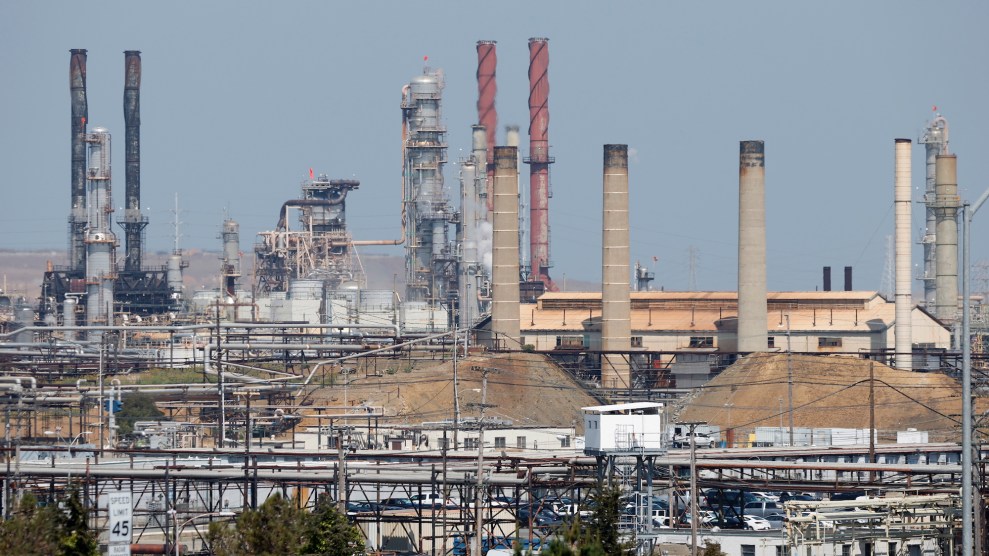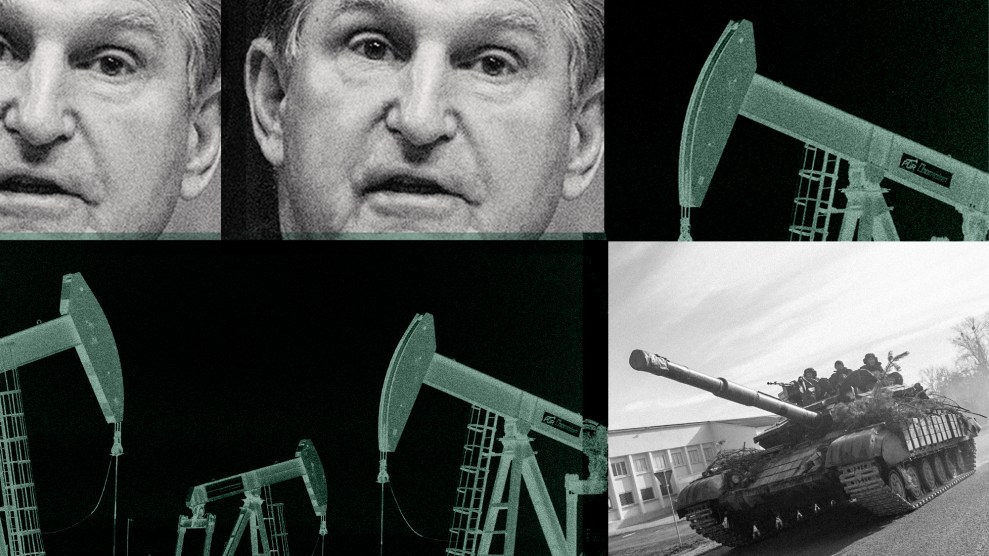
The Chevron Richmond Refinery in Richmond, CaliforniaJohn G. Mabanglo/EFE/Zuma
This story was originally published by the Guardian and is reproduced here as part of the Climate Desk collaboration.
The United States is poised to extract more oil and gas than ever before in 2023, a year that is certain to be the hottest ever recorded, providing a daunting backdrop to crucial United Nations climate talks that hold the hope of an agreement to end the era of fossil fuels.
The US’s status as the world’s leading oil and gas behemoth has only strengthened this year, even amid warnings from Joe Biden himself over the unfolding climate crisis, with the latest federal government forecast showing a record 12.9 million barrels of crude oil, more than double what was produced a decade ago, will be extracted in 2023.
Records will also be broken this year for gas production, with a glut of new export terminals on the Gulf of Mexico coast facilitating a boom that will see US exports of liquified natural gas (LNG) double in the next four years.
Tellingly, the US government expects this frenzy of oil and gas activity to continue at near-record levels right up to 2050, a point at which scientists say planet-heating emissions must be eliminated to avoid catastrophic climate breakdown. A third of the world’s planned oil and gas expansion in this period will occur in the US, a recent report found.
At the Cop28 climate summit, starting in Dubai this week, the European Union and a cadre of “high ambition” countries that range from Kenya to Samoa will push for an agreed “phaseout” of fossil fuels. António Guterres, secretary general of the UN, has called fossil fuel production the “poisonous root” of the climate crisis that should be dismantled. “Cop28 must send a clear signal that the fossil fuel age is out of gas, that its end is inevitable,” he said.
The US’s surging fossil fuel production casts a pall over such ambitions, however. “It’s particularly alarming to see the projections of record US oil and gas production year after year until 2050,” said Michael Lazarus, a senior scientist at Stockholm Environment Institute, which helped produce a recent UN report finding the world is planning double the amount of fossil fuel production consistent with remaining within a 1.5C (2.7F) global temperature rise compared with pre-industrial times.
“The US is locking in production for years that makes it hard to meet climate goals,” he said. “It’s out of sync and it needs reckoning.”
Under Biden, the US has passed its first major climate legislation, called the Inflation Reduction Act, which has spurred record investment in clean energy such as solar and wind, as well as propel sales of electric vehicles.
The Biden administration has fashioned new pollution rules to slash emissions from cars, trucks and power plants and recently struck a renewed agreement with China, the only country that emits more carbon than the US, to do more to stem the climate crisis. US energy emissions, meanwhile, have been edging downwards and are expected to drop 3 percent this year, albeit at a slower rate than needed to meet its own climate goals.
“A US priority will be how to catalyze action to keep to 1.5C, and there are going to be lots of conversations with countries to phrase that in a way that makes the most sense,” said Nate Hultman, a former aide to Kerry, now an expert in climate policy at the University of Maryland. “But we have a dynamic that feels awkward, of how to reconcile the world we are living in, that’s heavily fossil fuel-driven, with the vision of a clean, non-emitting world. That’s the tension.”
Even if such a phaseout declaration is made in Dubai, there is little certainty it will be swiftly fulfilled within the voluntary Cop process. A previous agreement to “phase down” coal use, at a Cop meeting in Scotland in 2021, was followed a year later by the UK allowing the creation of a new coal mine. Multiple new coal plants continue to spring up in China, meanwhile, despite Kerry agitating for the country’s coal use to be curbed.
Halting the use of fossil fuels, the primary cause of the climate crisis, has been elusive in three decades of international climate talks, with major producers now planning a major ramp-up even in the face of escalating heatwaves, floods, droughts and other climate change-fueled disasters.
Biden may have provided a popular boost to renewable energy in the US, but displacing a firmly entrenched fossil fuel industry via a carbon tax or other regulations remains a political no-go area, beyond a fee charged for waste emissions of methane, a potent planet-heating gas.
Instead, Biden has been handing out oil and gas drilling leases on public lands at a rate comparable to Donald Trump, with the emissions from 17 large projects permitted by his administration, including the controversial Willow oil complex in Alaska, set to cause more than 3.2 billion metric tons of greenhouse gases over their lifetime, a new report by the Center for Biological Diversity calculated.
“What the Inflation Reduction Act didn’t do in any way is disincentivize the use of fossil fuels—it was all carrots and no sticks,” said Kelly Gallagher, a former climate adviser to Barack Obama’s administration and now interim dean at the Fletcher School at Tufts University. “If the US had done this 20 years ago, it would be a great approach to grow clean energy first before reducing fossil fuel production. But we have very little time now.
“What’s difficult is that we are in an election year now and it’s unlikely that President Biden is going to take steps to hasten the decline of fossil fuels in the US.”
For large oil and gas companies, Cop28 does not yet appear to be a death knell. The summit’s president, Sultan Ahmed Al Jaber, chief executive of Adnoc, the national oil company of the United Arab Emirates, has talked enthusiastically about working with industry to phase down emissions, rather than scrap the central business model of oil and gas extraction itself.
“My hope would be that you start to see more emphasis put on a problem statement of eliminating emissions, versus a problem statement focused on the oil and gas industry per se,” Darren Woods, chief executive of Exxon, said this month.













